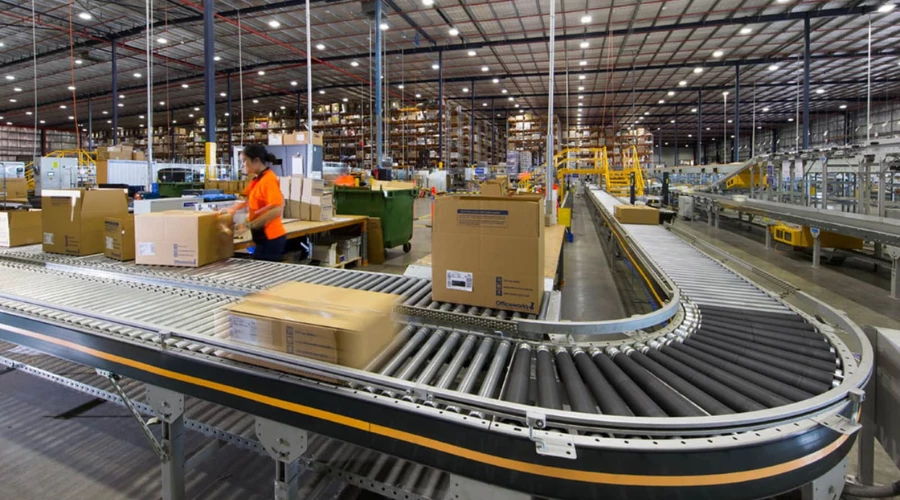
In today's fast-paced world of e-commerce and logistics, warehouse operations play a crucial role in ensuring efficient supply chain management. To keep up with the increasing demands of modern consumers, warehouses are constantly seeking innovative solutions to optimise their operations. One such solution that has been revolutionising the industry is using conveyors. Beyond their traditional role on assembly lines, conveyors remarkably transform warehouse operations. This article will explore the various benefits of using conveyors in warehouses and how they reshape logistics.
1. Improved Efficiency and Productivity
Conveyors offer significant improvements in efficiency and productivity within warehouse operations. By automating the movement of goods, they eliminate the need for manual handling and reduce the time required for various tasks. With conveyors, goods can be transported quickly and seamlessly from one area to another, streamlining the workflow. This increased efficiency leads to higher productivity levels, allowing warehouses to process larger orders within shorter time frames.
2. Enhanced Safety
Worker safety is of paramount importance in any warehouse environment. Conveyors contribute to improved safety by reducing the risk of accidents and injuries associated with manual material handling. Manual lifting and carrying heavy objects can lead to strains, sprains, and other musculoskeletal injuries. By automating these tasks, conveyors minimise the physical stress on workers, reducing the likelihood of such damage. Additionally, conveyors can be equipped with safety features like emergency stop buttons and sensors to ensure the well-being of employees.
3. Optimal Space Utilization
Warehouse space is often limited and expensive. Conveyors help maximise space utilisation by efficiently organising the layout of the facility. They can be designed to navigate around obstacles, go through mezzanine levels, or even spiral upwards, vertical space utilisation. By using conveyor systems, warehouses can make the most out of their available space, enabling them to store and handle larger goods.
4. Order Accuracy and Precision
An accurate order fulfilment can harm a warehouse's reputation and customer satisfaction. Conveyors significantly reduce the chances of errors during order processing. With automation, products are tracked and sorted accurately, ensuring that the correct item is delivered to the right place at the right time. Barcode scanners and other advanced technologies integrated into conveyor systems help maintain order precision and minimise the occurrence of mistakes.
5. Scalability and Adaptability
Conveyors offer scalability and adaptability, making them suitable for warehouses of various sizes and types. Whether a warehouse deals with small packages, heavy goods, or irregularly shaped items, conveyors can be customised to accommodate diverse requirements. They can be extended, modified, or reconfigured to adapt to evolving business needs. This flexibility enables warehouses to scale their operations as their business grows and remain agile in changing market demands.
6. Cost Savings
While the initial investment in conveyor systems may seem substantial, they can result in significant cost savings in the long run. By increasing efficiency, productivity, and accuracy, conveyors help reduce labour costs. They minimise the need for manual labour and eliminate errors that could lead to additional expenses, such as returns and customer dissatisfaction. Furthermore, conveyor systems reduce product damage by handling items gently and securely, avoiding costly losses due to mishandling.
7. Competitive Advantage
In today's competitive market, gaining a competitive edge is crucial for businesses. By embracing conveyor technology, warehouses can differentiate themselves from their competitors. Efficient and streamlined operations made possible by conveyors allow warehouses to fulfill orders faster, offer shorter delivery times, and provide a better overall customer experience. These advantages contribute to customer loyalty, positive reviews, and repeat business, giving warehouses a competitive advantage in the industry.
Conclusion
In conclusion, the integration of conveyors in warehouse operations extends beyond the assembly line. They are catalysts for innovation, enabling warehouses to meet the challenges of a rapidly evolving industry head-on. 13Sqft.com can help you harness the power of conveyors and warehouses to streamline their operations, exceed customer expectations, and secure a competitive advantage that propels them to new heights of success.
POSTED BY
Ishika Adhana
Digital Marketing Executive